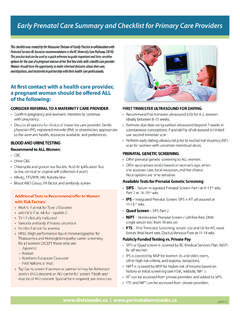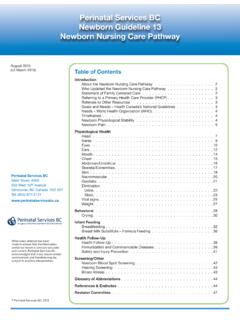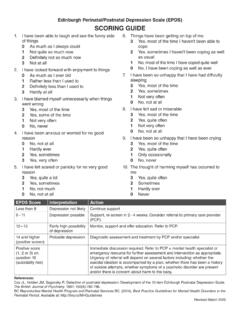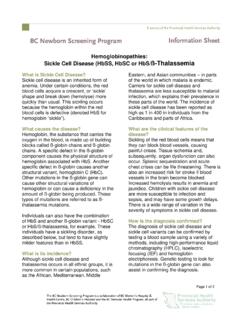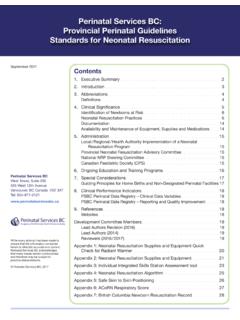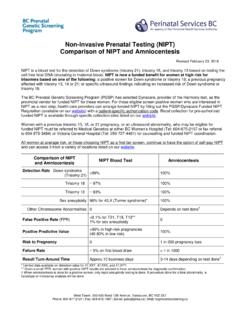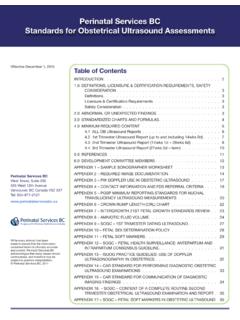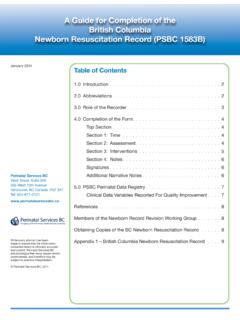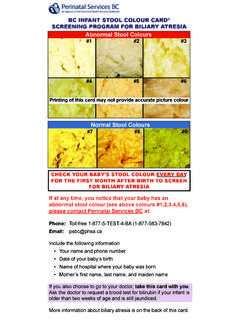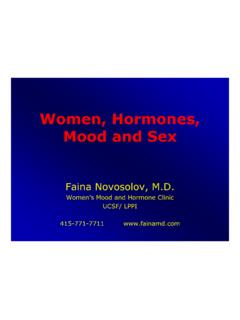Transcription of Perinatal Services BC Antidepressant Use During …
1 Perinatal Services BC. Antidepressant Use During pregnancy : considerations for the Newborn Exposed to SSRIs/SNRIs May 2013. Table of Contents Executive Summary.. 2. Introduction.. 4. Statement of Women centred Care .. 4. Definitions and Abbreviations .. 5. Background & Clinical Significance .. 5. SSRI/SNRI Exposure and Neonatal Adaptation Syndrome .. 6. Persistent Pulmonary Hypertension .. 7. Perinatal Services BC. West Tower, 3rd Floor Congenital Heart Defects .. 8. 555 West 12th Avenue Vancouver, BC Canada V5Z 3X7. Tel: (604) 877-2121 Place of birth.. 8. Discharge Follow up .. 9. Breastfeeding.
2 10. References .. 11. While every attempt has been made to ensure that the information contained herein is clinically accurate and current, Perinatal Services BC. Appendix A: Newborns Exposed to SSRIs/SNRIs acknowledges that many issues remain During pregnancy Algorithm.. 13. controversial, and therefore may be subject to practice interpretation. Perinatal Services BC, 2013 Appendix B: The ACoRN Process Primary Survey and Neurological Sequence.. 14. Development Committee Members and Expert Reviewers .. 16. Executive Summary and Recommendations This guideline provides advice for the monitoring, care and follow-up of newborns exposed to selective serotonin reuptake inhibitors (SSRIs) or serotonin-norepinephrine reuptake inhibitors (SNRIs) in utero.
3 Mood disturbances requiring clinical attention, such as depression and anxiety, are common During pregnancy . While there are risks to pharmaceutical treatment During pregnancy , untreated or incompletely managed depression also carries risks for the exposed newborn. After careful consideration of the risks and benefits of pharmaceutical treatment, many women and their caregivers decide to continue treatment with SSRIs/SNRIs During their pregnancy . While most newborns born to women who continue SSRI/SNRI treatment During pregnancy are healthy, an increased risk for neonatal behavioral disturbances led the Canadian Pediatric Society (CPS) to issue a position statement in 2011 (titled Selective Serotonin Reuptake Inhibitors in pregnancy and Infant Outcomes).
4 Recommending that newborns exposed to SSRIs in the second half of pregnancy be observed in hospital for at least 48 hours. To further guide clinical practice, a review of the literature and best practice was undertaken by Perinatal Services BC (PSBC) to clarify what constituted surveillance. In this guideline we focus on three neonatal outcomes that have been highlighted in the literature within the first 48 hours following delivery: neonatal adaptation syndrome, congenital heart defects, and persistent pulmonary hypertension. We recommend that parents be educated prior to the delivery about the increased risks their newborns have for these conditions and be informed about the additional screening their newborn will receive in the first 24 hours.
5 Approximately one third of newborns exposed to SSRIs/SNRIs in utero will experience neonatal adaptation syndrome (NAS), which generally presents within a few hours following birth and may include a combination of respiratory distress, feeding difficulty, jitteriness, irritability, temperature instability, sleep problems, tremors, shivering, restlessness, jaundice, rigidity, and hypoglycaemia. As with all newborns that present with abnormal signs and symptoms a differential diagnosis should include metabolic, infectious, cardiologic and congenital disorders and appropriate assessments should be pursued.
6 The diagnosis of NAS should only be made after other possible causes of the newborn's symptoms have been ruled out. Typically NAS symptoms are mild and transient, generally resolving within 2 to 3 weeks of delivery. Consider providing supportive care such as a quiet, low-light environment. While it has not been studied in a population of NAS newborns, we recommend using the low-risk, non-invasive interventions shown to improve outcomes in babies suffering neonatal abstinence syndrome, including skin-to-skin contact. This has been shown to improve temperature regulation, breathing regularity, behavioural state, weight gain, and overall newborn health in babies suffering from NAS.
7 Persistent pulmonary hypertension of the newborn (PPHN) is defined as a failure of the normal relaxation in the fetal pulmonary vascular bed During the circulatory transition that occurs shortly after birth. PPHN is very rare, and occurs with differing severity. There is a slightly increased risk of PPHN in newborns exposed to SSRIs in utero; however the absolute risk is very small. Given that PPHN has a 10% mortality rate; it is recommended that exposed newborns have their vital signs assessed every 4 hours for the first 24 hours following delivery and this should include the use of pulse oximetry to test oxygen saturation (SpO2) at each assessment.
8 The first SpO2 should be done at approximately 1-hour post delivery. Newborns with a low SpO2 should undergo consultation with a pediatrician if available. If a pediatrician is not available, consult BC Women's NICU. While first trimester use of SSRIs/SNRIs does not significantly increase the risks for birth defects, there appears to be a slightly increased risk of congenital heart defects associated with their use (particularly with exposure to paroxetine). We recommend a thorough clinical exam immediately at delivery and prior to discharge from hospital, and the use of pulse oximetry to screen for congenital heart defects in the first 24 hours and at the time of discharge.
9 If a newborn has a low SpO2, consult with a pediatric cardiology and consider possible echocardiography. The one-month visit should include a complete newborn clinical exam with particular attention paid to the possibility of septal defects that may not have been detected by initial screening. 2 Perinatal Services BC. Recommendations 1 Parents should be educated prior to delivery about the increased risks for neonatal adaptation syndrome, congenital heart defects, and PPHN. This includes being informed of the screening their newborn will receive in the first 24 hours. (A). 2 Differential diagnosis and assessment is required for symptoms and signs of neonatal irritability, poor feeding and respiratory difficulties to rule out infectious, metabolic, circulatory and neurological conditions.
10 Other withdrawals should also be ruled out. (A). 3 Focus on supportive care and emphasize that neonatal adaptation syndrome symptoms are usually mild and transient. (A). 4 Newborns exposed to SSRIs/SNRIs in utero should have their vitals assessed every 4 hours for the first 24 hours including the use of pulse oximetry at each assessment. The first SpO2 should be at approximately 1 hour post delivery. Newborns with a low SpO2 should undergo consultation with a pediatrician if available. If a pediatrician is not available, consult BC Women's NICU. (A). 5 All newborns born after in utero exposure to SSRI/SNRI require a complete clinical exam immediately after delivery and prior to discharge from hospital.
